Cyclone Gabrielle: people stranded in flood waters in New Zealand as minister says ‘We must act now’ on climate crisis – live updates | New Zealand
Cyclone is a ‘climate change-related event’, minister says

Tess McClure
Before parliament adjourned to focus on crisis management, New Zealand’s climate minister, James Shaw, has had some stern words to say about the government’s “inaction” on climate change.
As I stand here today, I struggle to find words to express what I am thinking and feeling about this particular crisis. I don’t think I’ve ever felt as sad or as angry about the lost decades that we spent bickering and arguing about whether climate change was real or not, whether it was caused by humans or not, whether it was bad or not, whether we should do something about it or not, because it is clearly here now, and if we do not act, it will get worse.
Shaw then quoted Winston Churchill, saying: “The era of procrastination, of half measures, of soothing and baffling expedience of delays, is coming to its close. In its place we are entering a period of consequences.”
He continued:
There will be people who say it’s ‘too soon’ to talk about these things … but we are standing in it right now. This is a climate change-related event.
We need to stop making excuses for inaction. We cannot put our heads in the sand when the beach is flooding. We must act now.
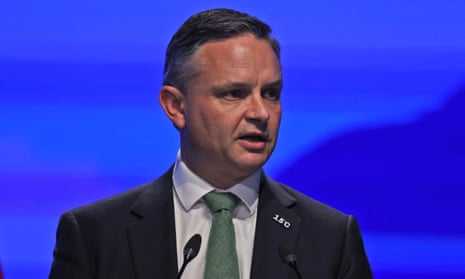
Key events
Please turn on JavaScript to use this feature
Aotearoa New Zealand correspondent for the Guardian, Tess McClure, has written about the extraordinary speech given by the climate change minister, James Shaw, in parliament today as Cyclone Gabrielle devastates the country.
His furious speech excoriated the New Zealand parliament for lost decades of “bickering” over the climate crisis.
Shaw, who is co-leader of the Green party, attributed the scale of the disaster to the climate crisis, saying: “There will be people who say it’s ‘too soon’ to talk about these things … but we are standing in it right now. This is a climate change-related event. The severity of it, of course, made worse by the fact that our global temperatures have already increased by 1.1 degrees.
“We need to stop making excuses for inaction. We cannot put our heads in the sand when the beach is flooding. We must act now.”
You can read the full story here:
Cyclone tracking south-east
At 3pm (0200 GMT) Cyclone Gabrielle was around 160km (100 miles) south-east of Auckland, near the east coast of the country’s North Island, and is expected to continue moving south-east, roughly parallel to the coast, Reuters reports.
Weather warnings remain in place for much of the east coast of the North Island and upper South Island.
Kieran McAnulty, minister of emergency management, said that while New Zealand was now through the worst of the storm, more rain and high winds were expected.
The country was suffering from extensive flooding, landslides and damage to roads and infrastructure, he added.
Residents describe fleeing at night
Agence France-Presse writes about the extent of the damage unfolding in the North Island:
This is only the third time New Zealand has declared a state of emergency – following the 2019 Christchurch attacks and the Covid-19 pandemic.
Daylight [on Tuesday morning] revealed the severity of the disaster: roads eaten away by landslips and collapsed homes buried in mud, silt and a slew of storm detritus.
Falling trees smashed power lines and flood waters blocked several roads, leaving communities across the country’s north stranded.
Local media reported some were forced to swim from their homes to safety.
Others waded through stormwaters on foot.
“At about midnight we got the emergency text saying ‘evacuate’,” recalled Jane Scott, a resident of coastal community Muriwai, who gathered a torch and a few essentials before seeking refugee in a local community centre.
“It was pitch black and pouring with rain,” she told local channel TVNZ. “It was very scary.”
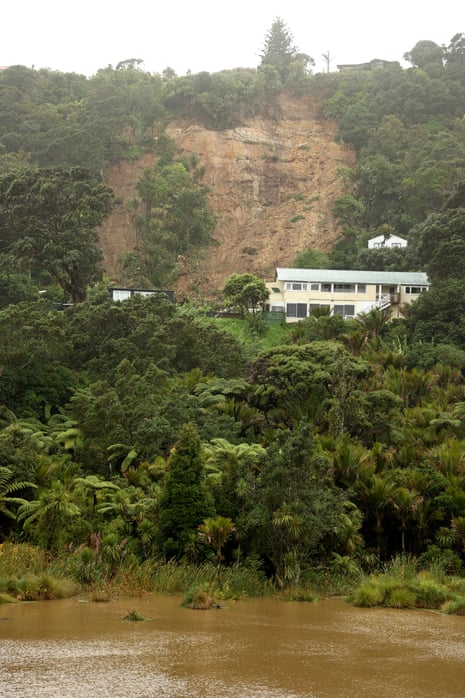
Wellington whipped by 146km/h winds
The storm is also lashing the southern parts of the North Island, with the New Zealand Herald reporting 146km/h wind gusts at Mount Kaukau in the northern suburbs of Wellington.
“Wind speeds appear to be increasing along with heavy rainfall – and the council is starting to receive reports of trees toppling and flooding,” said Chris Mathews, Wellington City Council’s resilience manager.
Wellington residents have been advised to hunker down.
Auckland airport suspends all domestic flights due to high winds
Air New Zealand has also advised that all domestic flights in and out of Auckland have been cancelled for the remainder of Tuesday and is expected to affect around 55 flights.
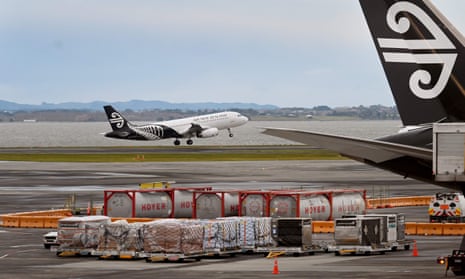
Auckland airport said ground handling operations (baggage loading/unloading) have needed to pause “due to wind speed on the airfield, and the need to protect the safety of airport workers”.
Domestic and international flights are currently suspended, due to high winds.
Ground handling operations (baggage loading/unloading) have needed to pause due to wind speed on the airfield, and the need to protect the safety of airport workers.— Auckland Airport (@AKL_Airport) February 14, 2023
Here are some of the images we have received over our news wires this afternoon.
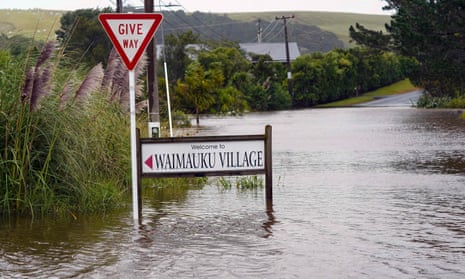
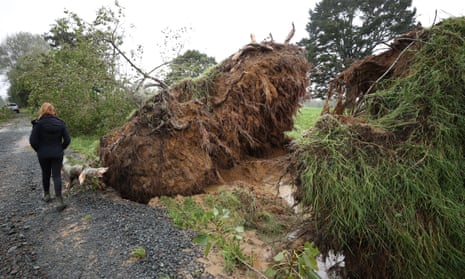
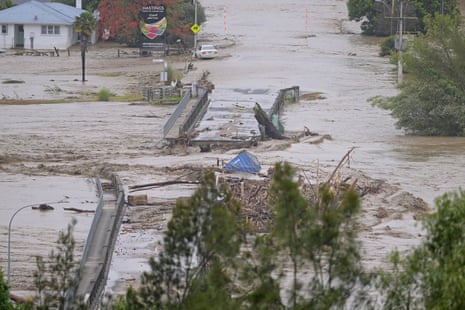
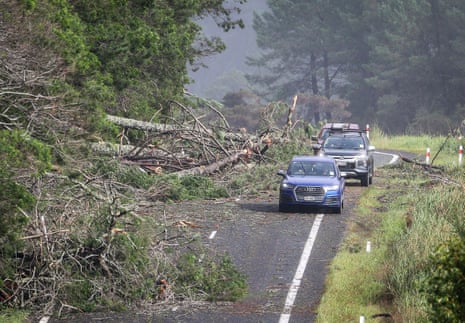
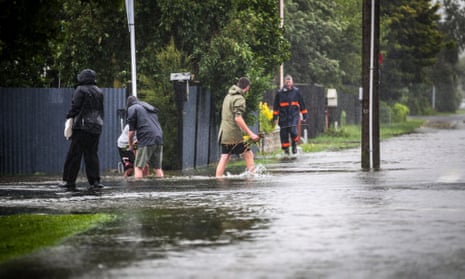
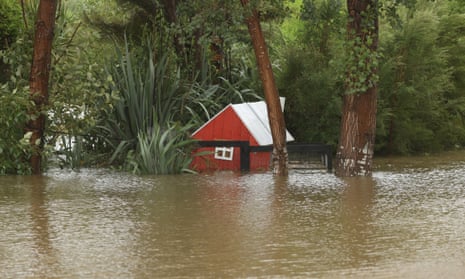

225,000 people without power
A total 225,000 people across the country are now without power, the energy minister, Megan Woods, has told reporters.
“This is the largest disruption to electricity infrastructure since [the 1988] Cyclone Bola,” Woods said.
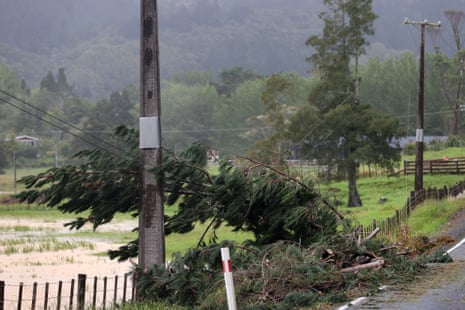
Tell us: have you been affected by Cyclone Gabrielle in New Zealand?
We would like to hear from you if you have been affected by the disaster and are in a safe place to communicate. Please do not take any unnecessary risks in order to contact us. We would particularly like to hear from those who are in or in contact with those in the areas that appear worst-affected: Northland, Tolaga Bay, Gisborne/Tairāwhiti, west Auckland and Coromandel, but also those affected throughout the country.
How have you been affected personally, physically or mentally? Have you or your family suffered any damage to your property or livelihood? Do you live abroad but have loved ones in New Zealand who are affected? How do you feel about the response so far from the authorities?
You can use the form here to send them to us.
Cyclone is a ‘climate change-related event’, minister says

Tess McClure
Before parliament adjourned to focus on crisis management, New Zealand’s climate minister, James Shaw, has had some stern words to say about the government’s “inaction” on climate change.
As I stand here today, I struggle to find words to express what I am thinking and feeling about this particular crisis. I don’t think I’ve ever felt as sad or as angry about the lost decades that we spent bickering and arguing about whether climate change was real or not, whether it was caused by humans or not, whether it was bad or not, whether we should do something about it or not, because it is clearly here now, and if we do not act, it will get worse.
Shaw then quoted Winston Churchill, saying: “The era of procrastination, of half measures, of soothing and baffling expedience of delays, is coming to its close. In its place we are entering a period of consequences.”
He continued:
There will be people who say it’s ‘too soon’ to talk about these things … but we are standing in it right now. This is a climate change-related event.
We need to stop making excuses for inaction. We cannot put our heads in the sand when the beach is flooding. We must act now.

A road has collapsed on Auckland’s Āwhitu Peninsula after a massive landslide hit the area.
The collapse happened on Lighthouse Road, caused by relentless heavy rain that’s lashed the North Island in recent days.
Images supplied to various local media outlets and shared online show the extent of the slip on the peninsula.

Tess McClure
Parliament to adjourn early as MPs respond to ‘most severe weather event that New Zealand has experienced this century’
New Zealand’s parliament will adjourn early to allow MPs to focus on the cyclone and work in their communities.
The House had its first sitting of the year today, and House leader and finance minister Grant Robertson moved that parliament adjourn until Tuesday the following week.
Cyclone Gabrielle represents the most severe weather event that New Zealand has experienced this century,” he said.
I know that all parties would rather that we were able to carry on, but in the circumstances facing many New Zealanders today, whose lives and livelihoods have been devastated, the right thing to do is to do our jobs and our communities and return here next week.
